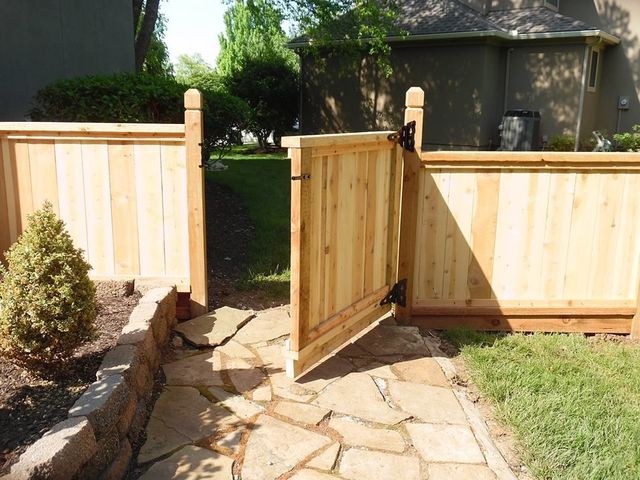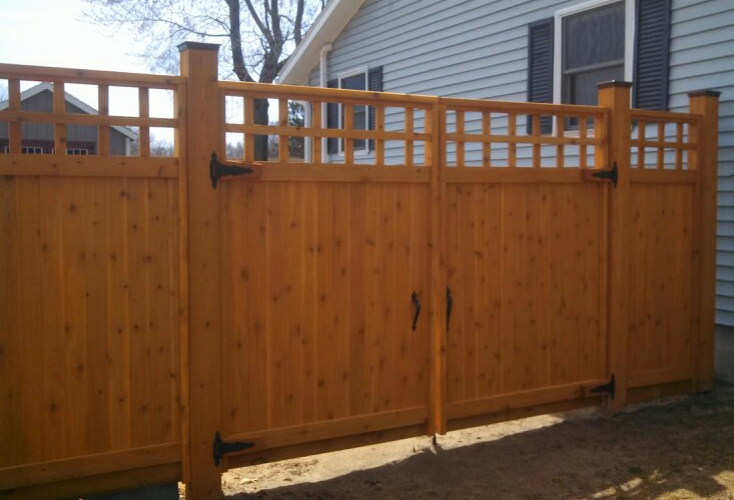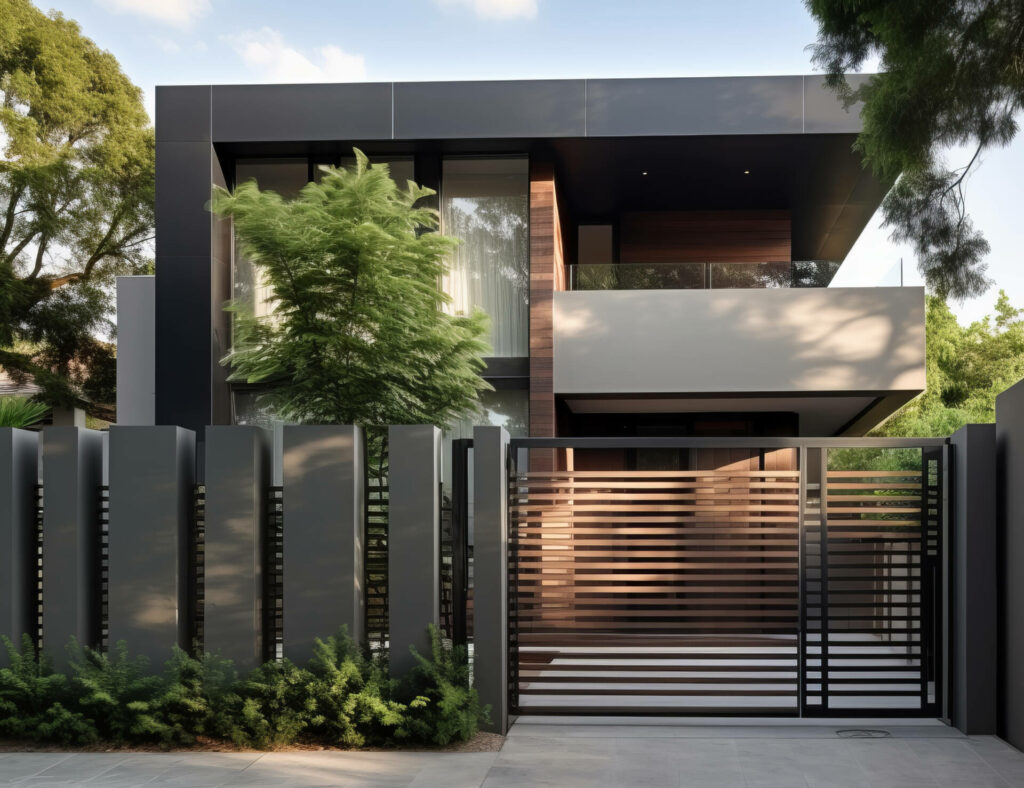All Categories
Featured
When selecting a fencing for your home, it's necessary to take into consideration factors like price, sturdiness, upkeep, and aesthetic appeal. Three of one of the most prominent products for industrial and property fences are timber, plastic, and light weight aluminum. Each offers special benefits and some drawbacks, making it important to examine your needs before making a decision. Listed below, we compare the benefits and drawbacks of these materials to assist lead your option.
Timber Secure Fencing. Pros:
![]()
Natural Aesthetic: Wood fences are known for their classic, all-natural appearance. They can easily blend into a lot of landscapes and boost the appeal of your home or business. Whether you're intending for a rustic look or an extra polished surface, timber can be customized with paint, tarnish, or sealer. Modification: Wood is just one of one of the most versatile materials, permitting for a wide array of designs, such as picket fences, privacy fencings, and ranch-style rooms. It's simple to change the layout to fit the certain demands of your residential property. Budget-friendly: Normally, wood fences come at a reduced initial price contrasted to vinyl or light weight aluminum, making them an economical choice for those on a spending plan. Disadvantages:
Upkeep Demands: Timber fencings require routine upkeep to preserve their appeal and functionality. This includes discoloration or paint to shield against rot, termites, and climate damage. Without appropriate care, wood can break down with time. Much Shorter Lifespan: Compared to plastic or light weight aluminum, timber fencings have a tendency to have a shorter life-span, particularly in areas with extreme weather condition. Severe conditions, such as heavy rain, humidity, or snow, can trigger wood to wear away extra rapidly. Prone to Damages: Timber fences are at risk to harm from insects, consisting of termites, as well as natural wear from weather. They may also warp or fracture otherwise effectively kept. Vinyl Fencing. Pros:
Low Upkeep: Among the primary benefits of plastic fences is that they call for minimal maintenance. Unlike wood, vinyl does not need to be painted, sealed, or discolored. It's resistant to fading, staining, and fracturing, which conserves time and cash on maintenance. Sturdiness: Plastic is recognized for its capability to endure extreme climate condition without deteriorating. It's unsusceptible bugs like termites, and its resistance to moisture and UV rays ensures it stays looking great for years. Lasting: A vinyl fence can last up to thirty years or more, making it a fantastic long-term financial investment. Lots of manufacturers offer guarantees, better boosting its value. Range of Styles: Plastic fencings are available in different shades and styles, consisting of those that simulate wood. You can choose from privacy, picket, or attractive designs, offering adaptability to match your home or organization. Disadvantages:
![]()
Higher Upfront Price: Vinyl fences tend to have a greater preliminary price than wood. While the long-term savings on maintenance are substantial, the in advance financial investment might be a deterrent for some home owners. Minimal Customization: Vinyl fencings been available in common styles, and while shades and styles are diverse, you might not have as much adaptability for personalization contrasted to wood. Breaking in Cold Climates: While vinyl is resilient, in exceptionally cool climates, it can end up being fragile and crack upon impact, which might be problematic in locations with harsh winter seasons. Light weight aluminum Fence. Pros:
Low Upkeep: Aluminum fences are recognized for their low-maintenance requirements. Unlike timber, light weight aluminum does not rust or corrode, and it doesn't need to be repainted or sealed. This makes it a great selection for those who desire a problem-free option. Resilience and Strength: Light weight aluminum is a robust material that stands up well to severe climate condition. It's an excellent choice for coastal areas where saltwater corrosion is a concern, as it's resistant to corrosion. Visual Appeal: Light weight aluminum fences provide a tidy, stylish look, commonly utilized for ornamental purposes. They're available in different styles, consisting of ornamental layouts, and can include a high-end feel to your residential or commercial property. Safety and security: Aluminum fences are sturdy and offer wonderful security, specifically when set up with locks or gateways. Their strong building and construction provides a reputable barrier versus unwanted entrance. Cons:
![]()
Higher First Expense: Aluminum fences tend to be more expensive than timber, especially if you choose attractive designs. The ahead of time cost might be excessive for some. Much Less Personal privacy: Aluminum fencings generally have bigger gaps in between the slats, which indicates they provide much less privacy than timber or plastic fences. If privacy is a priority, light weight aluminum may not be the most effective alternative. Denting Concerns: While light weight aluminum is rust-resistant, it is prone to flexing or nicking if struck with force. A vehicle mishap or hefty effect can create enduring damage to the fence. Which Fencing Product is Right for You? Selecting the ideal fence depends on numerous variables, including your budget plan, style preferences, maintenance capacity, and the atmosphere in which you live. Wood could be the right option if you desire a natural appearance and are prepared for routine maintenance. Vinyl is a great option if low-maintenance and longevity are your concerns. For those who prefer a smooth, modern-day look with very little care, aluminum offers a lasting, safe service.
Inevitably, each fencing material has its benefits and drawbacks, so it is necessary to review what matters most for your details needs. Take into consideration the environment, the level of privacy you need, and how much upkeep you're eager to devote to, and you'll discover the perfect fence for your residential or commercial property.
Timber Secure Fencing. Pros:

Natural Aesthetic: Wood fences are known for their classic, all-natural appearance. They can easily blend into a lot of landscapes and boost the appeal of your home or business. Whether you're intending for a rustic look or an extra polished surface, timber can be customized with paint, tarnish, or sealer. Modification: Wood is just one of one of the most versatile materials, permitting for a wide array of designs, such as picket fences, privacy fencings, and ranch-style rooms. It's simple to change the layout to fit the certain demands of your residential property. Budget-friendly: Normally, wood fences come at a reduced initial price contrasted to vinyl or light weight aluminum, making them an economical choice for those on a spending plan. Disadvantages:
Upkeep Demands: Timber fencings require routine upkeep to preserve their appeal and functionality. This includes discoloration or paint to shield against rot, termites, and climate damage. Without appropriate care, wood can break down with time. Much Shorter Lifespan: Compared to plastic or light weight aluminum, timber fencings have a tendency to have a shorter life-span, particularly in areas with extreme weather condition. Severe conditions, such as heavy rain, humidity, or snow, can trigger wood to wear away extra rapidly. Prone to Damages: Timber fences are at risk to harm from insects, consisting of termites, as well as natural wear from weather. They may also warp or fracture otherwise effectively kept. Vinyl Fencing. Pros:
Low Upkeep: Among the primary benefits of plastic fences is that they call for minimal maintenance. Unlike wood, vinyl does not need to be painted, sealed, or discolored. It's resistant to fading, staining, and fracturing, which conserves time and cash on maintenance. Sturdiness: Plastic is recognized for its capability to endure extreme climate condition without deteriorating. It's unsusceptible bugs like termites, and its resistance to moisture and UV rays ensures it stays looking great for years. Lasting: A vinyl fence can last up to thirty years or more, making it a fantastic long-term financial investment. Lots of manufacturers offer guarantees, better boosting its value. Range of Styles: Plastic fencings are available in different shades and styles, consisting of those that simulate wood. You can choose from privacy, picket, or attractive designs, offering adaptability to match your home or organization. Disadvantages:

Higher Upfront Price: Vinyl fences tend to have a greater preliminary price than wood. While the long-term savings on maintenance are substantial, the in advance financial investment might be a deterrent for some home owners. Minimal Customization: Vinyl fencings been available in common styles, and while shades and styles are diverse, you might not have as much adaptability for personalization contrasted to wood. Breaking in Cold Climates: While vinyl is resilient, in exceptionally cool climates, it can end up being fragile and crack upon impact, which might be problematic in locations with harsh winter seasons. Light weight aluminum Fence. Pros:
Low Upkeep: Aluminum fences are recognized for their low-maintenance requirements. Unlike timber, light weight aluminum does not rust or corrode, and it doesn't need to be repainted or sealed. This makes it a great selection for those who desire a problem-free option. Resilience and Strength: Light weight aluminum is a robust material that stands up well to severe climate condition. It's an excellent choice for coastal areas where saltwater corrosion is a concern, as it's resistant to corrosion. Visual Appeal: Light weight aluminum fences provide a tidy, stylish look, commonly utilized for ornamental purposes. They're available in different styles, consisting of ornamental layouts, and can include a high-end feel to your residential or commercial property. Safety and security: Aluminum fences are sturdy and offer wonderful security, specifically when set up with locks or gateways. Their strong building and construction provides a reputable barrier versus unwanted entrance. Cons:

Higher First Expense: Aluminum fences tend to be more expensive than timber, especially if you choose attractive designs. The ahead of time cost might be excessive for some. Much Less Personal privacy: Aluminum fencings generally have bigger gaps in between the slats, which indicates they provide much less privacy than timber or plastic fences. If privacy is a priority, light weight aluminum may not be the most effective alternative. Denting Concerns: While light weight aluminum is rust-resistant, it is prone to flexing or nicking if struck with force. A vehicle mishap or hefty effect can create enduring damage to the fence. Which Fencing Product is Right for You? Selecting the ideal fence depends on numerous variables, including your budget plan, style preferences, maintenance capacity, and the atmosphere in which you live. Wood could be the right option if you desire a natural appearance and are prepared for routine maintenance. Vinyl is a great option if low-maintenance and longevity are your concerns. For those who prefer a smooth, modern-day look with very little care, aluminum offers a lasting, safe service.
Inevitably, each fencing material has its benefits and drawbacks, so it is necessary to review what matters most for your details needs. Take into consideration the environment, the level of privacy you need, and how much upkeep you're eager to devote to, and you'll discover the perfect fence for your residential or commercial property.
Latest Posts
Check Out Top Car Repair Services at Montclare Auto Repair – Expert Care for Your Vehicle
Published en
1 min read
Why Consistent Car Maintenance at Montclare Auto Repair Reduces Costs
Published en
1 min read
Find the Greatest Auto Repair Offers in Montclare, Chicago
Published en
1 min read
More
Latest Posts
Check Out Top Car Repair Services at Montclare Auto Repair – Expert Care for Your Vehicle
Published Jun 01, 25
1 min read
Why Consistent Car Maintenance at Montclare Auto Repair Reduces Costs
Published May 30, 25
1 min read
Find the Greatest Auto Repair Offers in Montclare, Chicago
Published May 27, 25
1 min read